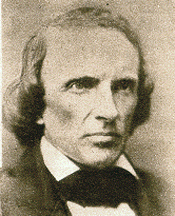|

|
Chapter 4: American Transcendentalism
William Henry Channing
1810-1884
|
©
Paul P. Reuben
September 11, 2019
E-Mail
|
Page
Links: |
Primary
Works |
Selected
Bibliography
|
MLA Style
Citation of this Web Page
|
| A
Brief Biography |

Primary
Works
Channing
contibuted to and published The Western Messenger, Present,
and The Spirit of the Age. He also contributed to the Harbinger
and Dial. He wrote two books: Memoir of William
Ellery Channing and Memoirs of Margaret Fuller Ossoli.
Selected
Bibliography
Lyttle, David. Studies
in
Religion in Early American Literature: Edwards, Poe, Channing,
Emerson, Some Minor Transcendentalists, Hawthorne, and Thoreau.
Lanham: UP of America, 1983.
Mendelsohn, Jack.
Channing, the Reluctant Radical; a Biography, 1971. BX9869 C4
M45
Petrulionis, Sandra
H.
"William Henry Channing." in Mott, Wesley T. ed. The American
Renaissance in New England: Fourth Series. Detroit: Gale,
Detroit, 2001.
Wagenknecht, Edward
C.
Ambassadors for Christ: Seven American Preachers. NY:
Oxford UP, 1972.
| Top
| William Henry Channing (1810-1884): A Brief
Biography
A Student
Project by Michael Minot
William Henry
Channing was a
rarity among Transcendentalists because of his political conscience.
He was probably the sole social activist of the group. He extended
the Transcendentalist concept of the self into an ideal of
selflessness. His was a " renewed social and political vision. " Man
was to be a " new moral creation... transfigured. " This led to " a
desire to glorify God in a perfect social life." (Robinson 172)
Emerson
called him "' the evil time's sole patriot .'" (Swift 225)
Channing was born in
Boston
in 1810 to a prominent family. He was the nephew of William
Ellery Channing,
the
famous Unitarian minister, who had a profound influence on him. He
went to Boston Latin School and graduated from Harvard College in
1829. He was already associated with Transcendentalists at Harvard.
He attended Harvard Divinity School until 1833 and became an
itinerant Unitarian preacher, eventually settling in New York where
he grappled with urban poverty and immigration.
He moved to
Cincinnati in
1835 and found it less free than the East. He leaned towards
Thoreau
in his outlook. He began to publish The Western Messenger. He
virtually became a Deist
while in the West.
He moved back to New
England
in 1841 and translated Jouffrey's Introduction to Ethics for
George
Ripley. He
contributed to the Dial. He became active in every reform:
anti-slavery, peace, temperance, and women's rights. He became
involved with Brook
Farm.
While at Brook Farm,
he is
strongly credited for the change to Fourierism,
possibly because of its emphasis on collective humanity over the
individual. He was interested in unity. He wrote for the
Harbinger. He did not think that the community was religious
enough, though he tolerated this.
"In 1857 he was
honored by
replacing England's most influential Liberal Unitarian preacher."
(Myerson 24 )
He called this
"'pivotal'"
because he "was able to reconcile his political enthusiasm with his
commitment to the church." (Robinson 182) He remained the rest of his
life in England, returning to pastor a church in Washington, D.C.,
during the Civil War. He also was Senate chaplain.
Channing was
troubled with a
"disease of disproportionate specualtion." (Swift 218) He was
labelled as impractical. He feared that the "'one divine far-off
event' might happen before breakfast." (Habich 23) He thought that
the only darkness came from "'one's own shadow, beneath his feet.'"
(Habich 24)
Channing represents
among
Transcendentalists "the fervent hope for social justice." (Robinson
184) He died in 1884.
Channing was the
social
activist among the Transcendentalists. Apparently his spirit never
rested as he ever sought to improve upon humanity. He was not happy
with the intellectual side of the movement.
Works Cited
Habich, Robert. "The
'
Spiral Ascending Path ' of William Henry Channing: An
Autobiographical Letter." ESQ, 30:1 (1984): 22 - 26.
Myerson, Joel.
"William
Henry Channing." Dictionary of Literary Biography, Vol 1, Ed.
Joel Myerson, Bruccoli Clark. Detroit, MI, 1978: 24.
Robinson David. "The
Political Odyssey of William Henry Channing." American
Quarterly 34:2 (1982): 165 - 184.
Swift, Lindsay. Brook
Farm. Citadel, NJ, 1973.
MLA
Style
Citation of this Web Page:
Reuben,
Paul P. "Chapter 4: William Henry Channing." PAL: Perspectives in
American Literature- A Research and Reference Guide. WWW URL:
http://www.paulreuben.website/pal/chap4/channing_henry.html (provide
page date or date of your login).
| Top |

